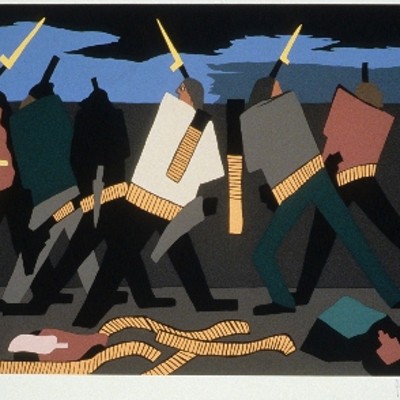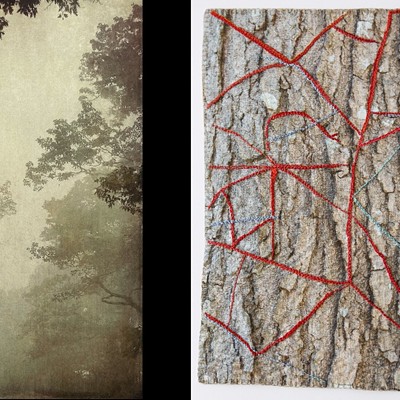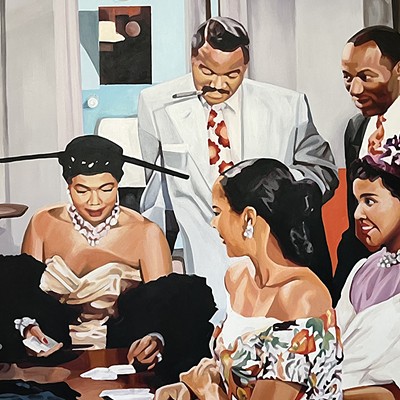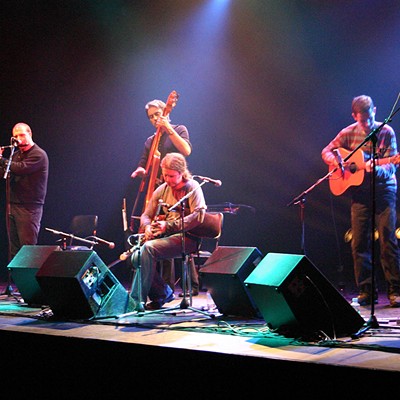But Dean Stoffle, who runs the UA Library, apparently did NOT!
The dean must have hated Sinski's presence! And his pop-up exhibitions!
She wanted him out of her library. No one quite knows the reason.
She took away his office and tried to get hold of his tomes.
From now on the pop-up book shows will be the library's own, no opposition brooked!
It could be Stoffle's head wasn't screwed on just right.
It could be, perhaps, that her shoes were too tight.
But some think that the most likely reason of all
May have been that her heart was two sizes too small.
AT A RECENT holiday dinner, UA Library Dean Carla Stoffle told the Friends of the UA Library that this year's annual holiday pop-up book show had been waylaid by the construction now going on in Special Collections.
Little Cindy-Lou Who might have swallowed that Grinchy near-fib. But it was hardly the whole truth, says James T. Sinski, the curator of pop-up book exhibitions at the library since 1984. The critically acclaimed exhibitions annually drew some 50,000 visitors, many of them schoolchildren.
Construction certainly has wreaked havoc on the library, but there's a bigger reason for the pop-up no-show. Stoffle has imposed a new set of conditions that have so offended the elderly volunteer that he has vowed never again to curate pop-up shows at the library.
"One of the emeritus members of the library faculty called the dean's treatment of me 'shoddy,'" Sinski said. "I think I called it 'vindictive.'"
Sinski, 73, a retired UA professor of microbiology, additionally has decided to bequeath his collection, appraised at $100,000, to another institution. The shelves in his university-neighborhood home are lined with illustrated pop-up books, marvels of paper engineering in which, say, a Gothic cathedral jumps off the page in an architecture tome.
"You must see Ben's Box," he said eagerly on a recent sunny morning, reaching for a children's story that has a washing-machine box metamorphosing into 3-D ships and other treasures.
Dressed in a Christmas sweater, his white hair carefully combed, Sinski recalled how pop-up books became a later-life addiction. He had written a science volume on grisly skin conditions in 1974, and friend Alexander Britain gave him a pop-up Thumbelina as an antidote, saying, "This is a real book."
His collection grew to about 1,600 volumes. Most are first editions, some of them are signed, and almost all of them would have gone in perpetuity to the UA Library had Dean Stoffle not stepped in. Now Sinski is negotiating to will the gift to Pratt Institute of Art in New York City.
"Since 1995, I've been donating books to the library," he said. "That will cease."
Sinski said that over the years he has volunteered 20 hours a week, 50 weeks a year at the library, working on the exhibitions, soliciting books, classifying them on a computer, writing each year's exhibition catalogue.
After he retired from microbiology, he was given an office in the library. At his age it was getting difficult to carry the piles of bulky books from home to the library, he explained, so then-Special Collections librarian Peter Steere kindly suggested he give publishers the library's address. Ever since, he's had review copies sent to him directly at the library. (Steere later left the library, one of the hordes of professional staff who have departed during Stoffle's controversial reign. See "Photo Finish," October 26.) Eventually Sinski's workspace was downgraded, and he was assigned to a storage room.
After last year's pop-up exhibition opened, Sinski was unceremoniously kicked out of those lowly quarters and told he could no longer work at the library.
Then an official letter from the library brought fresh insults. Writing on April 3, 2000, a member of Stoffle's staff, special collections librarian Bonnie L. Travers, informed him of Stoffle's new rules:
· Any review copies sent to a library office would automatically become the library's property, even if they were addressed to Sinski. "Those items on receipt become state property," Travers writes. "Seeking review copies can no longer be done at the library."
The reason for the change? The letter implies that the elderly book lover might have been soliciting the pop-ups for personal profit. "It has become necessary to firm up procedures so that it is clear that soliciting material as a library volunteer in no way benefits you personally."
Sinski found the implication insulting. He had already been making a free-will donation of all the books exhibited in his shows since 1995. And the only profit he ever got out of them was a tax deduction, he said, which doesn't begin to offset his hours of free labor for the library.
· Though Sinski has established himself as an expert in the field of pop-up books, writing articles in journals and forming relationships with publishers and artists, who have sometimes traveled to Tucson to open the exhibitions, Travers declares in her letter that she herself will take over the shows Sinski founded and curated. He can remain on as her assistant. "I have been assigned the responsibility to curate all future Special Collections exhibitions," Travers writes. She invites him to curate a show in 2001, but cautions that he will no longer have control over it: "If you accept this invitation, we can collaborate over the theme, choice of books, and their arrangement..."
· Travers informs him that "at some point in the future" will staff catalog the books he's donated to make them available to the public. (The library has already had some of the books for five years.) If and when that time comes around, the books will be called The James T. Sinski Pop-Up Book Collection.
· Travers thanks Sinski for his years of labor but notes that he may not find the new arrangements "workable." She goes on: "It is your decision as to whether or not you want to continue to curate the pop-up book exhibition within the parameters outlined here."
Hurt and surprised, Sinski wrote back to say no thanks and to detail his long list of grievances. He said he has received no response to his letter.
Sinski has his own ideas why Stoffle and her staff treated him so shabbily after so many years of volunteer service. He believes it is because "I was not a team player. I did things personally. I was getting much too popular. She wanted to get rid of me." Stoffle was out of town and could not be reached for comment. Travers did not answer an e-mailed set of questions by press time.
Pop-up exhibitions may continue in the future at the library, but without the input of the local expert. If Tucsonans are left feeling that a Grinch has stolen their holiday exhibition, Sinski himself is as wounded as a Who waking up to find that no Christmas is coming.
"I would have done this 'til I dropped," Sinski said.











